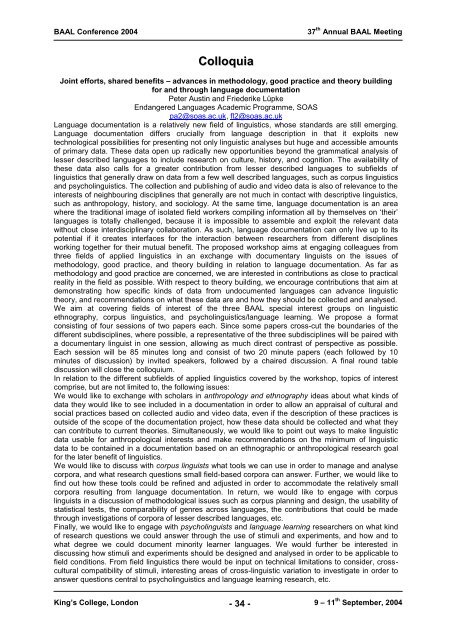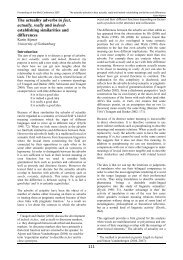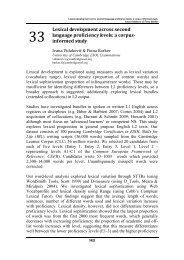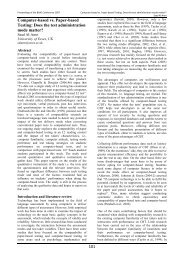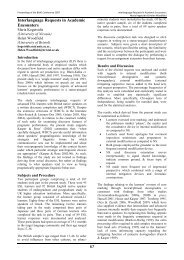Colloquia - British Association for Applied Linguistics
Colloquia - British Association for Applied Linguistics
Colloquia - British Association for Applied Linguistics
You also want an ePaper? Increase the reach of your titles
YUMPU automatically turns print PDFs into web optimized ePapers that Google loves.
BAAL Conference 2004 37 th Annual BAAL Meeting<br />
<strong>Colloquia</strong><br />
Joint ef<strong>for</strong>ts, shared benefits – advances in methodology, good practice and theory building<br />
<strong>for</strong> and through language documentation<br />
Peter Austin and Friederike Lüpke<br />
Endangered Languages Academic Programme, SOAS<br />
pa2@soas.ac.uk, fl2@soas.ac.uk<br />
Language documentation is a relatively new field of linguistics, whose standards are still emerging.<br />
Language documentation differs crucially from language description in that it exploits new<br />
technological possibilities <strong>for</strong> presenting not only linguistic analyses but huge and accessible amounts<br />
of primary data. These data open up radically new opportunities beyond the grammatical analysis of<br />
lesser described languages to include research on culture, history, and cognition. The availability of<br />
these data also calls <strong>for</strong> a greater contribution from lesser described languages to subfields of<br />
linguistics that generally draw on data from a few well described languages, such as corpus linguistics<br />
and psycholinguistics. The collection and publishing of audio and video data is also of relevance to the<br />
interests of neighbouring disciplines that generally are not much in contact with descriptive linguistics,<br />
such as anthropology, history, and sociology. At the same time, language documentation is an area<br />
where the traditional image of isolated field workers compiling in<strong>for</strong>mation all by themselves on „their‟<br />
languages is totally challenged, because it is impossible to assemble and exploit the relevant data<br />
without close interdisciplinary collaboration. As such, language documentation can only live up to its<br />
potential if it creates interfaces <strong>for</strong> the interaction between researchers from different disciplines<br />
working together <strong>for</strong> their mutual benefit. The proposed workshop aims at engaging colleagues from<br />
three fields of applied linguistics in an exchange with documentary linguists on the issues of<br />
methodology, good practice, and theory building in relation to language documentation. As far as<br />
methodology and good practice are concerned, we are interested in contributions as close to practical<br />
reality in the field as possible. With respect to theory building, we encourage contributions that aim at<br />
demonstrating how specific kinds of data from undocumented languages can advance linguistic<br />
theory, and recommendations on what these data are and how they should be collected and analysed.<br />
We aim at covering fields of interest of the three BAAL special interest groups on linguistic<br />
ethnography, corpus linguistics, and psycholinguistics/language learning. We propose a <strong>for</strong>mat<br />
consisting of four sessions of two papers each. Since some papers cross-cut the boundaries of the<br />
different subdisciplines, where possible, a representative of the three subdisciplines will be paired with<br />
a documentary linguist in one session, allowing as much direct contrast of perspective as possible.<br />
Each session will be 85 minutes long and consist of two 20 minute papers (each followed by 10<br />
minutes of discussion) by invited speakers, followed by a chaired discussion. A final round table<br />
discussion will close the colloquium.<br />
In relation to the different subfields of applied linguistics covered by the workshop, topics of interest<br />
comprise, but are not limited to, the following issues:<br />
We would like to exchange with scholars in anthropology and ethnography ideas about what kinds of<br />
data they would like to see included in a documentation in order to allow an appraisal of cultural and<br />
social practices based on collected audio and video data, even if the description of these practices is<br />
outside of the scope of the documentation project, how these data should be collected and what they<br />
can contribute to current theories. Simultaneously, we would like to point out ways to make linguistic<br />
data usable <strong>for</strong> anthropological interests and make recommendations on the minimum of linguistic<br />
data to be contained in a documentation based on an ethnographic or anthropological research goal<br />
<strong>for</strong> the later benefit of linguistics.<br />
We would like to discuss with corpus linguists what tools we can use in order to manage and analyse<br />
corpora, and what research questions small field-based corpora can answer. Further, we would like to<br />
find out how these tools could be refined and adjusted in order to accommodate the relatively small<br />
corpora resulting from language documentation. In return, we would like to engage with corpus<br />
linguists in a discussion of methodological issues such as corpus planning and design, the usability of<br />
statistical tests, the comparability of genres across languages, the contributions that could be made<br />
through investigations of corpora of lesser described languages, etc.<br />
Finally, we would like to engage with psycholinguists and language learning researchers on what kind<br />
of research questions we could answer through the use of stimuli and experiments, and how and to<br />
what degree we could document minority learner languages. We would further be interested in<br />
discussing how stimuli and experiments should be designed and analysed in order to be applicable to<br />
field conditions. From field linguistics there would be input on technical limitations to consider, crosscultural<br />
compatibility of stimuli, interesting areas of cross-linguistic variation to investigate in order to<br />
answer questions central to psycholinguistics and language learning research, etc.<br />
King‟s College, London 9 – 11 th - 34 -<br />
September, 2004


